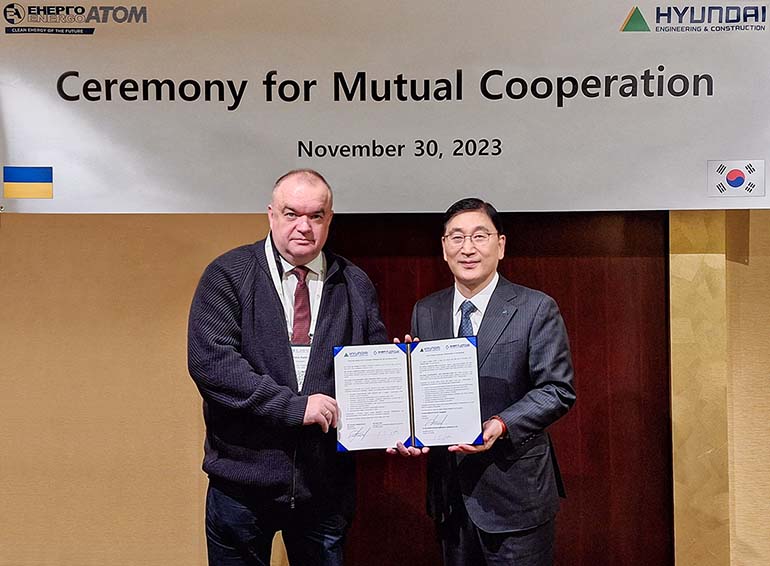
Latest News
- Hyundai E&C Shifts into High Gear to Enter Nordic Large-Scale Nuclear Market
- Hyundai E&C Strengthens Korea-Japan Cooperation in Energy Transition and New Growth Businesses
- Hyundai E&C Signals Green Light for Large-Scale Nuclear Power Plant Business in Europe
- Hyundai E&C Unveils Energy-driven Growth Strategy “H-Road”
- Hyundai E&C to Build First Unit of SMR-300, a Model for U.S.-Korea Energy Cooperation
Hyundai E&C to expand cooperation in the nuclear power plant project with Energoatom

[ Image of the LOI signing between Hyundai E&C-Energoatom. On November 30th (Local time), President Yoon Young-joon of Hyundai E&C (Right) and President Petro Kotin of Energoatom (Left) are taking a commemorative photo after signing the Letter of Intent (LOI) to cooperate in the overall nuclear power plant project in Paris, France ]
Hyundai E&C is picking up speed to enter into the global market for nuclear power plants through activities such as building a collaborative network with Energoatom. On 30th (Local time), Hyundai E&C signed a Letter of Intent (LOI) with Energoatom on the overall nuclear power plant project in Paris, France. Prior to this, in January of last year, Hyundai E&C signed a Non-disclosure Agreement (NDA) for mutual exchange of project information. This agreement was entered into during the World Nuclear Exhibition 2023(WNE) that was held in Paris Nord Villepinte from November 28th to 30th, and management executives from both companies including President Yoon Young-joon of Hyundai E&C and President Petro Kotin of Energoatom participated in the signing ceremony. Hyundai E&C and Energoatom are planning to seek out cooperation in nuclear power based on the LOI including support in pursuing the SMR and large nuclear power plant projects in Ukraine, securing resources for the development of new nuclear power plant and exchange of experience and technology related to research and development of nuclear power plants.
Hyundai E&C signed an MOU with ‘Holtec International’, a company specializing in nuclear power plants in US, to install up to 20 SMRs in the future following a pilot SMR installation in Ukraine by march 2029, and last month, it entered into an agreement with Ukrenergo on the new construction and repair of transmission and transformation facility in Warsaw, Poland, to further expand its breadth in the energy infrastructure rebuilding project of Ukraine. In particular, European market that is adjacent to Ukraine is a region where active discussions are being carried out on the construction of SMR and additional orders of large-scale nuclear power plants with activities such as the inclusion of nuclear power generation technology as the beneficiary of the Net Zero Industry Act (NZIA), that is known as the Inflation Reduction Act (IRA) of Europe. Through this cooperation, Hyundai E&C is expected to gain traction in perusing the entrance into the nuclear power project in Europe in addition to the recovery of the power system in Ukraine.
On one hand, this year, Hyundai E&C participated in the World Nuclear Exhibition, the world’s largest private nuclear exhibition that started in 2014, for the first time, to be proactive in networking with global companies specializing in nuclear power plants and relevant institutions. This year, 610 companies from 76 countries participated in the exhibition, and as such, Hyundai E&C is thought to be targeting the overseas nuclear power plant market. Relevant personnel of Hyundai E&C said, “From Shin-Gori Nuclear Power Plant, which was the first nuclear power plant in Korea, to Barakah Nuclear Energy Plant in UAE that Hyundai E&C exported for the first time, Hyundai E&C that set critical milestones in the nuclear power plant industry of Korea is solidifying its leading position in the entire value chain of nuclear power plants including SMR, decommissioning, storage facility, and large next-generation nuclear power plants,” and added, “We look forward to Korea’s nuclear industry entering into the global market as we are continuing to actively pursue the entrance into the European market through the signing of agreements and participation in exhibitions, and so forth”. Recently, Hyundai E&C proved its unrivaled construction quality and technical capability by being selected as the construction company for the construction of the main facility of Shin-Hanul nuclear power plants 3 and 4 that amounts to KRW 3.1195 trillion.

